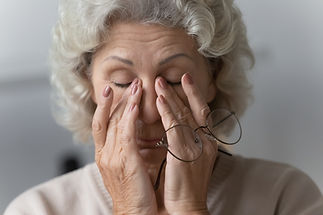
WHAT ARE THE CAUSES OF DRY EYE?
WHAT ARE THE CAUSES OF DRY EYE?



Dry Eye is a common and often chronic condition where the eyes do not produce enough tears, or the tears evaporate too quickly, leading to discomfort and vision problems. It occurs when the tear film that keeps the eyes lubricated becomes imbalanced, resulting in irritation, redness, burning, and a gritty or sandy feeling in the eyes. Dry Eye can be caused by various factors, including aging, environmental conditions, contact lens use, certain medications, or underlying health issues like autoimmune diseases.
Some of the more common causes are
Autoimmune Disorders:
Sjögren's Syndrome: A chronic autoimmune disease that directly targets the tear and salivary glands, leading to significant dry eye.
Rheumatoid Arthritis: Inflammation caused by this autoimmune condition can affect the tear glands, reducing tear production.
Lupus: Another autoimmune disorder that can cause inflammation of the tear glands, contributing to dry eye.
Scleroderma: This condition can lead to changes in the skin around the eyes and tear production, worsening dry eye symptoms.
Diabetes:
Poor blood sugar control can lead to nerve damage (including nerves that control tear production), which reduces tear secretion and exacerbates dry eye.
Thyroid Disorders:
Graves' Disease (hyperthyroidism) can cause inflammation and swelling in the tissues around the eyes, affecting tear production.
Hypothyroidism can also cause reduced tear production due to its impact on the lacrimal glands.
Menopause and Hormonal Changes:
The hormonal shifts during menopause, particularly the reduction in estrogen and androgens, can decrease tear production and contribute to dry eye.
Vitamin A Deficiency:
Vitamin A is essential for maintaining a healthy cornea and tear production. Deficiency can lead to dry eye and more severe eye conditions.
Rosacea:
Ocular rosacea, a subtype of rosacea that affects the eyes, can cause inflammation of the eyelids and meibomian glands, leading to dry eye.
Without proper treatment, Dry Eye can worsen over time and lead to serious complications such as inflammation, corneal damage, and impaired vision. Treatment options range from over-the-counter artificial tears to prescription eye drops, and lifestyle changes that help manage symptoms. If you’re experiencing persistent eye dryness, please contact us so we can arrange a consultation to assess and make a treatment plan that suites you. We have a variety of treatment plans for your dry eye needs. See below for further information.
